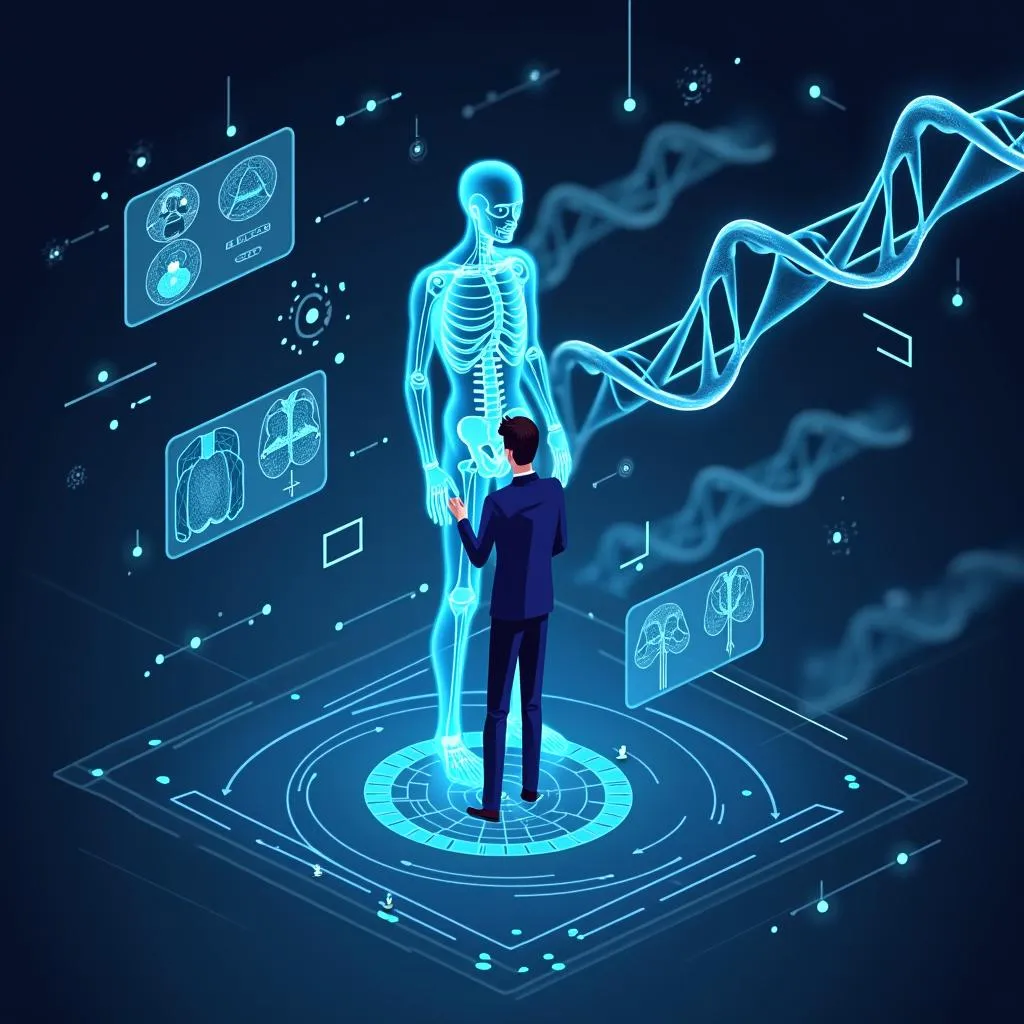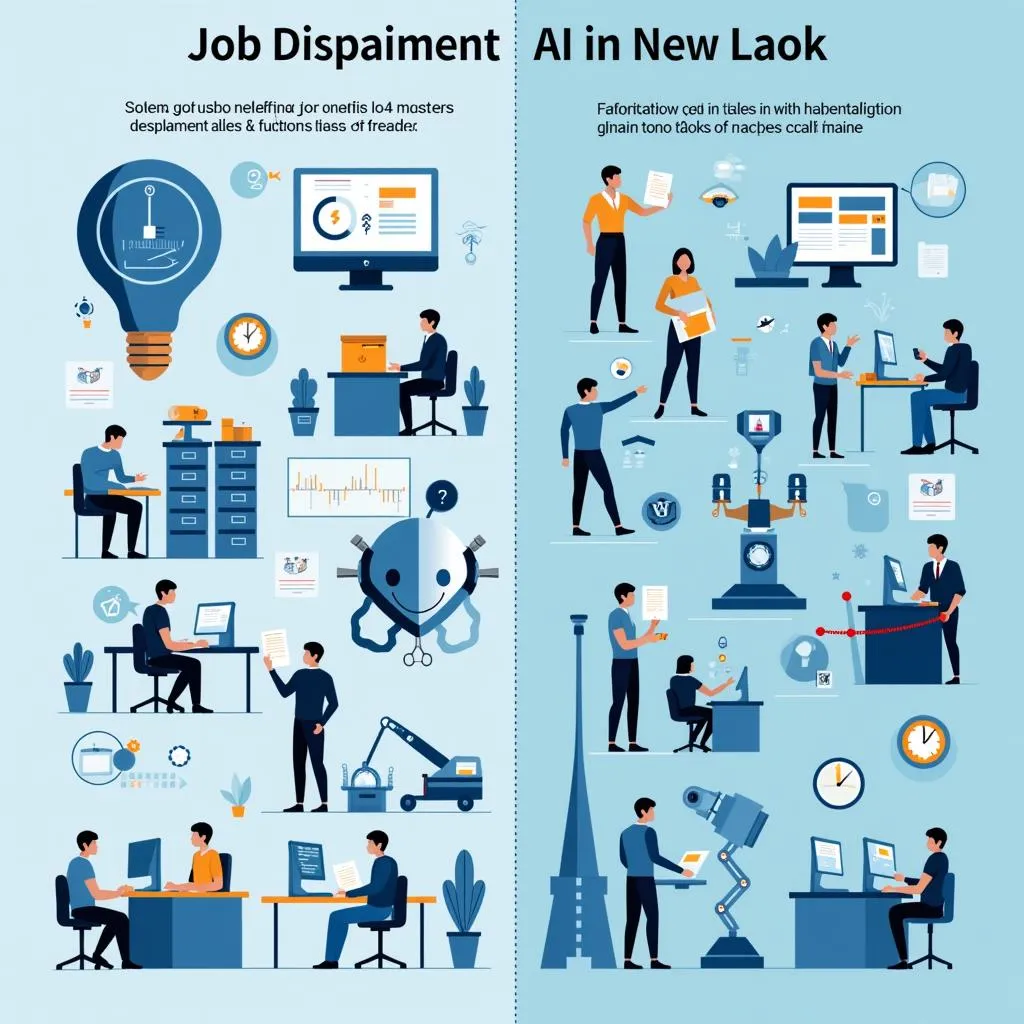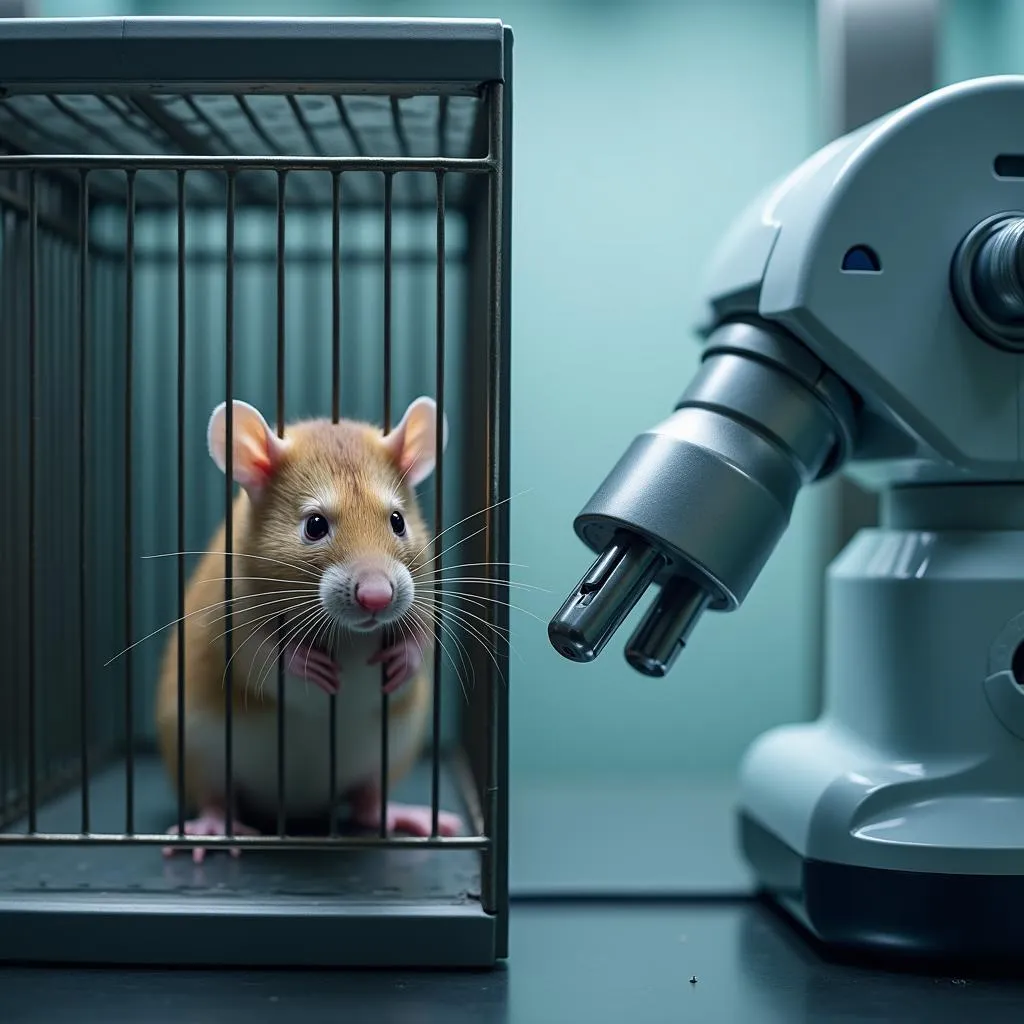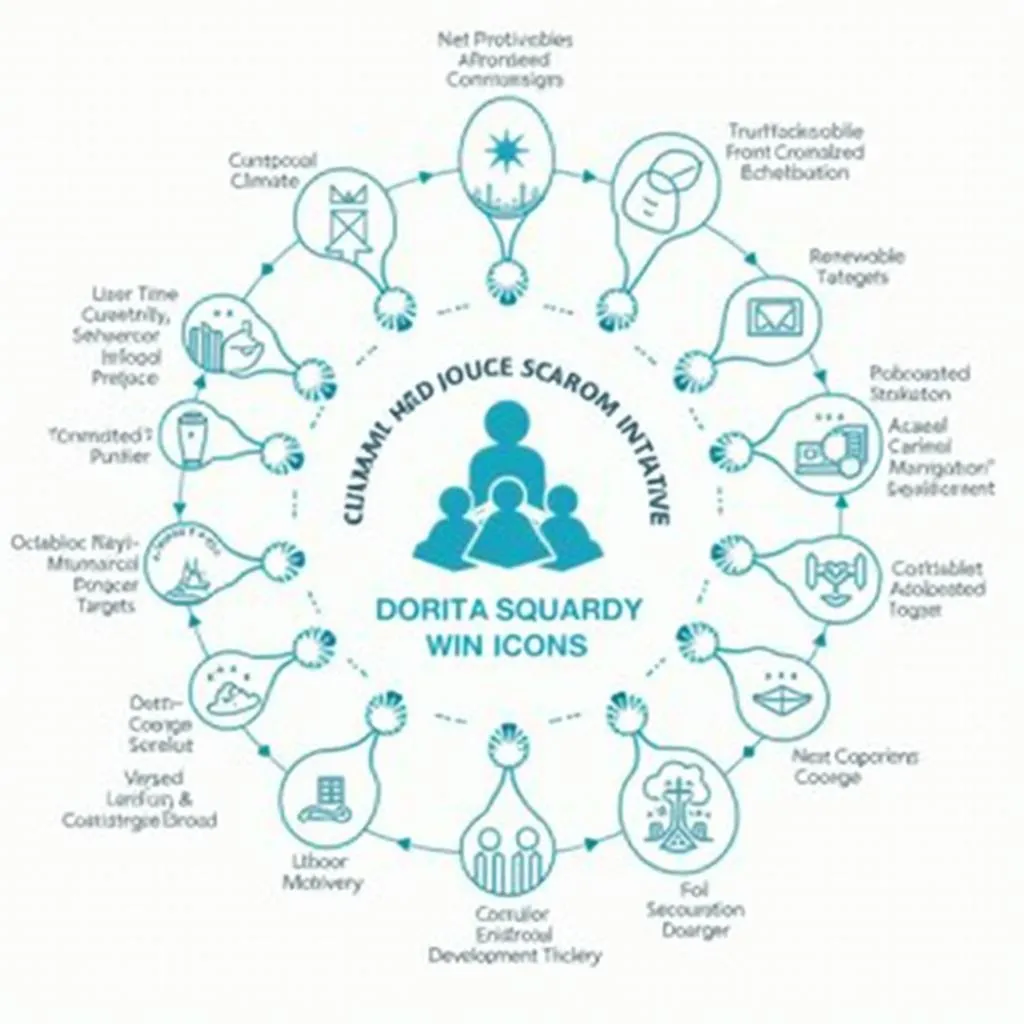The topic of genetic breakthroughs and their impact on medical advancements has become increasingly relevant in recent years. This subject has appeared in various forms in IELTS Writing Task 2 exams, reflecting its growing importance in scientific and ethical discussions. Based on past trends and the rapid progress in genetic research, it’s likely that this theme will continue to feature prominently in future IELTS tests. Let’s examine a specific question related to this topic and analyze sample essays across different band scores.
Nội dung bài viết
Some people think that developments in the field of artificial intelligence will have a positive impact on our future while others believe that it will bring about great problems for the world. Discuss both views and give your opinion.
Analysis of the Question
This question focuses on the potential impacts of artificial intelligence (AI) developments on our future. It requires candidates to:
- Discuss positive views on AI’s impact
- Explore concerns about AI’s potential problems
- Present a personal opinion on the matter
The task involves weighing both perspectives and formulating a balanced response that demonstrates critical thinking and the ability to analyze complex issues.
Sample Essay 1 (Band 8-9)
Artificial intelligence (AI) has emerged as a transformative technology with far-reaching implications for various aspects of our lives. While some individuals are optimistic about AI’s potential to revolutionize industries and improve living standards, others harbor concerns about its possible negative consequences. This essay will examine both perspectives before presenting my own viewpoint on this contentious issue.
Proponents of AI argue that its development will lead to significant advancements in numerous fields. In healthcare, for instance, AI-powered diagnostic tools can analyze medical images with unprecedented accuracy, potentially detecting diseases at earlier stages and saving countless lives. Moreover, AI systems can process vast amounts of data to accelerate drug discovery and development, as evidenced by the rapid creation of COVID-19 vaccines. In the realm of transportation, self-driving vehicles powered by AI have the potential to reduce accidents caused by human error and improve traffic flow in urban areas.
On the other hand, skeptics raise valid concerns about the widespread adoption of AI technologies. One major apprehension is the potential for job displacement, as AI systems become capable of performing tasks traditionally done by humans. This could lead to widespread unemployment and economic instability if not managed properly. Additionally, there are ethical concerns surrounding AI decision-making, particularly in sensitive areas such as criminal justice or loan approvals, where biases in training data could perpetuate or exacerbate existing social inequalities.
In my opinion, while the concerns about AI are legitimate and warrant careful consideration, the potential benefits of this technology outweigh the risks. I believe that with proper regulation and ethical guidelines, AI can be harnessed to address some of humanity’s most pressing challenges, from climate change to disease prevention. It is crucial, however, that we approach AI development with a focus on human-AI collaboration rather than replacement, ensuring that the technology augments human capabilities instead of rendering them obsolete.
In conclusion, the impact of AI on our future is likely to be profound and multifaceted. While it presents both opportunities and challenges, I am optimistic that with responsible development and implementation, AI can be a powerful force for positive change in the world.
(Word count: 345)
 AI in healthcare and genetic research
AI in healthcare and genetic research
Sample Essay 2 (Band 6-7)
Artificial intelligence (AI) is a topic that many people have different opinions about. Some think it will be very good for our future, while others worry it will cause big problems. In this essay, I will talk about both sides and give my own thoughts.
People who like AI say it can help us in many ways. For example, AI can make computers that are very smart and can do difficult jobs faster than humans. This could help doctors find diseases quicker or help scientists solve big problems like climate change. AI can also make our lives easier by doing boring jobs for us, like cleaning our houses or driving cars.
However, some people are worried about AI. They think it might take away jobs from humans, which could make many people unemployed. There are also fears that AI might become too smart and start making decisions that are bad for humans. Some people worry about privacy because AI needs a lot of data to work well, and this data might include personal information.
In my opinion, I think AI will probably be good for us overall, but we need to be careful about how we use it. We should make sure that AI is used to help humans, not replace them completely. It’s important that we have rules about how AI is used so that it doesn’t cause problems or hurt people. We also need to think about how to help people whose jobs might be affected by AI, maybe by training them to do new kinds of work.
To sum up, AI has both good and bad sides. I believe that if we use it wisely, it can make our lives better in many ways. But we need to be careful and think about the possible problems too.
(Word count: 298)
Sample Essay 3 (Band 5-6)
Artificial intelligence is a big topic today. Some people think it’s very good, but others think it’s bad. I will write about both ideas and what I think.
Good things about AI:
- It can help doctors find sickness faster
- It can do hard jobs that humans can’t do
- It can make our lives easier, like smart homes
Bad things about AI:
- It might take jobs from people
- It might be dangerous if it becomes too smart
- It might know too much about us and our private lives
I think AI is mostly good because it can help us do many things better. But we need to be careful. We should make rules about how to use AI so it doesn’t hurt people or take all our jobs.
In the end, AI can be good or bad. It depends on how we use it. We need to think carefully about how to make AI help us without causing problems.
(Word count: 147)
Explanation of Band Scores
Band 8-9 Essay:
This essay demonstrates excellent task achievement, coherence, lexical resource, and grammatical range and accuracy:
- Fully addresses all parts of the task with a well-developed response
- Presents a clear position throughout the essay
- Logically organizes ideas with clear progression
- Uses a wide range of vocabulary with very natural and sophisticated control
- Uses a wide range of complex structures with full flexibility and accuracy
Band 6-7 Essay:
This essay shows satisfactory to good performance across the marking criteria:
- Addresses all parts of the task, though some parts may be more fully covered than others
- Presents a relevant position, though conclusions may become unclear or repetitive
- Arranges information coherently and there is clear overall progression
- Uses an adequate range of vocabulary for the task with some attempts at less common words
- Uses a mix of simple and complex sentence forms with some flexibility and accuracy
Band 5-6 Essay:
This essay demonstrates modest to adequate performance:
- Addresses the task only partially; the format may be inappropriate in places
- Expresses a position but the development is not always clear
- Presents information with some organization but there may be a lack of overall progression
- Uses a limited range of vocabulary, but this is minimally adequate for the task
- Uses only a limited range of structures with some attempts at complex sentences
Key Vocabulary to Remember
-
Artificial intelligence (AI) (noun) /ˌɑːr.tɪ.fɪʃ.əl ɪnˈtel.ə.dʒəns/: The theory and development of computer systems able to perform tasks normally requiring human intelligence.
-
Transformative (adjective) /trænsˈfɔːr.mə.tɪv/: Causing a marked change in someone or something.
-
Implications (noun) /ˌɪm.plɪˈkeɪ.ʃənz/: The conclusion that can be drawn from something although it is not explicitly stated.
-
Unprecedented (adjective) /ʌnˈpres.ɪ.den.tɪd/: Never done or known before.
-
Apprehension (noun) /ˌæp.rɪˈhen.ʃən/: Anxiety or fear that something bad or unpleasant will happen.
-
Displacement (noun) /dɪˈspleɪs.mənt/: The act of moving something from its usual position.
-
Perpetuate (verb) /pərˈpetʃ.u.eɪt/: To cause to continue or to occur again and again.
-
Multifaceted (adjective) /ˌmʌl.tiˈfæs.ɪ.tɪd/: Having many different aspects or features.
These vocabulary items are crucial for discussing the complex topic of AI and its impacts, demonstrating a sophisticated lexical resource in your IELTS Writing Task 2 response.
 AI's impact on the job market
AI's impact on the job market
In conclusion, the topic of artificial intelligence and its impact on our future is a complex and multifaceted issue that is likely to appear in various forms in IELTS Writing Task 2. To prepare effectively, practice writing essays on related themes such as:
- The ethical implications of AI in decision-making processes
- The role of AI in addressing global challenges like climate change or healthcare crises
- The balance between AI innovation and job security in various industries
- The potential risks and benefits of AI in education and personal development
Remember to always analyze the question carefully, plan your response, and use a range of sophisticated vocabulary and complex sentence structures to showcase your language skills. Feel free to practice writing an essay on this topic and share it in the comments section for feedback and discussion with other learners.


